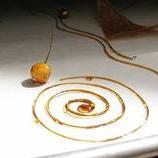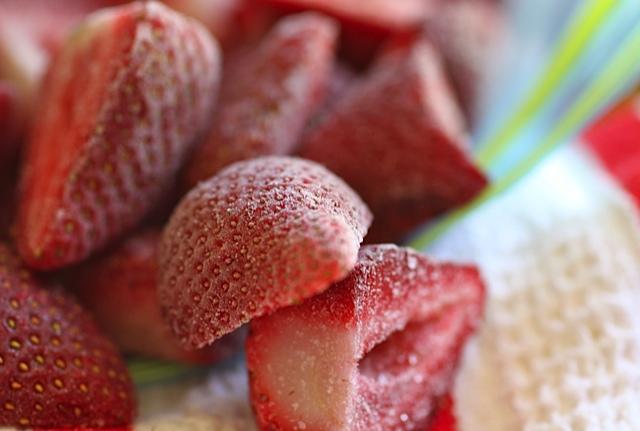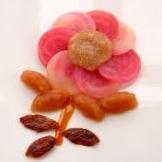Search the Community
Showing results for tags 'Reference'.
-
Researchers at Cornell have discovered that milk spoilage is caused by a unique, spore-forming bacteria that is triggered to grow by pasteurization. http://www.sciencedaily.com/releases/2012/07/120720201531.htm I found the part about higher pasteurization temperatures accelerated growth to be very interesting. The part about how dormant spores can survive for years despite current best efforts in sanitation makes me start to wonder how we can improve. This work will probably lead to new sanitation procedures not just for dairies, but also for restaurants and bakeries.
-
I picked up Lonely Planet Street Food (Amazon Link) a few days ago and it's a great book, 100 street foods from a cross the world, a little history on them, where to pick them up in their native countries and how to recreate them at home. It's a great addition to my collection and i've started working my through it already!
-
Do people own/have any good recommendations for cookbooks which have been self-published (or at least from small independent publishers)? Not that I think that there is anything inherently better about indie/self-publishing, but knowing people who have self-published (but not cookbooks) I know the problems of promotion and getting your work out there. So I though having such a wide ranging and knowledgeable community as eGullet (sycophantic I know!) collect and recommend some independent cookbooks would be useful for everyone!
-
We are two countries seperated by a common language. I have an English recipe that call for fine and porridge oats. I think the porridge oats are rolled oats... but what are the fine oats? Dan
-
At this time of year when you can hoard fresh, local strawberries because they are so abundant, why not freeze them and enjoy them all year long. Then you won't have to buy tasteless, fake looking ones in the dead of winter! The best way to preserve them, sugar-free, and have them fresh, year-round is to freeze them. Remember to start with the freshest strawberries possible. Strawberries start to lose freshness and nutrients quickly and will only last a few days in the fridge, so the sooner you freeze them the better. Follow these steps and they will last up to a year in the freezer: 1. Gently wash them and pat them dry or allow them to air dry for an hour or so. Slice off the tops, including the stem and any white area, then cut them in half lengthwise. 2. Line one or more rimmed baking sheets (depending on how many berries you have) with parchment or SilPats. Arrange them in a single layer on the sheets. and place them, uncovered, or loosely covered with plastic wrap in the freezer. Allow them to freeze solid, about 12 hours. Once frozen, transfer the berries (they may stick to the parchment a bit, but peel off relatively easy) to a freezer weight plastic zipper bag. Press out as much of the air from the bag as possible before sealing, to minimize freezer burn over time. If you are planning to leave them in the freezer for months, then consider double bagging them. Place the bagged berries in the freezer, where they will keep for up to one year. Note: I will warn you that the thawed berries will not be firm and bright like they were when raw and fresh. They tend to thaw out a bit mushier, and slightly darker…but can still be used for anything you would use fresh strawberries for. For smoothies, use frozen. Optional: Brushing the berries with a bit of lemon juice before you freeze them will help to preserve their color. While strawberries can be frozen whole, cut or crushed, they will retain a higher level of their vitamin C content if left whole.
-
Book recommendation::: Taste Buds and Molecules: The Art and Science of Food, Wine, and Flavor Taste Buds and Molecules after receiving my book from Amazon I jumped right in... this book out of all the books I own relating to wine, food, smell, taste, chemistry, is one that is indispensable ...it's a must read if you every want to understand the molecular nature of what the #ell you are tasting and not only wine... in college while taking organic chem I came to understand many things that related to me everyday... this book is like the Rosetta Stone... it has taken all the information I have ever read and constructed a wonderful, clear, intelligent, concise and to the point reference of all that is taste via pure science... I can not express to anyone ITB, or just a wine geek, or maybe a foodie ... you must read this book... it's easy to read... you don't have to start at the beginning you can jump around if you like... it's the ultimate Kama Sutra for taste... you will bring to yourself and others so much pleasure from this information that taste will never be the same again... ever !!!!
-
Does anyone else have this? I am absolutely loving it. I made a modified version of the Eclipse cocktail with tequila, Campari, cherry heering, and lemon juice. I am going to try some of the infusions used in a number of the cocktails. I only hope that the results are good with scaled down versions, since all the infusions require you to sacrifice a 750 ml bottle of spirits.
-
Any online references listing ingredients textures?
-
I'm in consideration for a position at a Latin small plates restaurant and need to bone up on examples of "modernizing" traditional Central & South American food. Can anyone more experienced in this area recommend books or blogs on latin cuisine using contemporary platings and variations on the traditional stuff?
-
I would like to expand my knowledge about the history of cooking in various countries in the world outside Europe, mainly Japan, China, India, the Persian area, but I'm open for everywhere. So I'm looking for books that deal about how a cooking style developed in relation with the area; I'm not interested in recipes, but in historical and sociological issues. Just for example, I'd like to read a book that tells the story of Kaiseki style, how it was born and developed, how the Japanese culture influenced it (Shintoism, temple cooking and so on). I'm more interested on the high end cooking styles, like Kaiseki and Imperial Chinese. But I'm quite ignorant and don't have any references on these matters. Can anyone help? Thanks in advance. Teo
-
Here are the winners for this year. Any thoughts? Cookbook of the Year Oaxaca al Gusto: An Infinite Gastronomy by Diana Kennedy (University of Texas Press) American Cooking Pig: King of the Southern Table by James Villas (John Wiley & Sons) Baking and Dessert Good to the Grain: Baking with Whole-Grain Flours by Kim Boyce (Stewart, Tabori & Chang) Beverage Secrets of the Sommeliers: How to Think and Drink Like the World’s Top Wine Professionals by Jordan Mackay and Rajat Parr (Ten Speed Press) Cooking from a Professional Point of View Noma: Time and Place in Nordic Cuisine by René Redzepi (Phaidon Press) General Cooking The Essential New York Times Cook Book: Classic Recipes for a New Century by Amanda Hesser (W.W. Norton & Company) Healthy Focus The Simple Art of EatingWell Cookbook by Jessie Price & the EatingWell Test Kitchen (The Countryman Press) International Stir-Frying to the Sky’s Edge: The Ultimate Guide to Mastery, with Authentic Recipes and Stories by Grace Young (Simon & Schuster) Photography Noma: Time and Place in Nordic Cuisine Photographer: Ditte Isager (Phaidon Press) Reference and Scholarship Salted: A Manifesto on the World’s Most Essential Mineral, with Recipes by Mark Bitterman (Ten Speed Press) Single Subj ect Meat: A Kitchen Education by James Peterson (Ten Speed Press) Writing and Literature Four Fish: The Future of the Last Wild Food by Paul Greenberg (The Penguin Press)
-
- Condiments
- Cookbook
-
(and 1 more)
Tagged with:
-
Hi all, I purchased Gordon Ramsay's "3 star chef" some time ago, and I've thoroughly enjoyed reading and cooking from it. What I particularly like about the book, is that it goes a long way in making "3 star restaurant food" accessible to dedicated home cooks. It takes time, patience, some ingredient hunting, but not overly expensive or hard-to-source equipment. This is pretty much the only "for the dedicated home cook/ambitious but do-able" cookbook reference I have in my collection, and I would now like to see what else there might be out there. I'm mostly interested in French/Italian cooking, and it's a great plus if recipes are given in metric. I am considering cookbooks by other celebrated chefs, such as titles by Heston Blumenthal, Alain Ducasse, Rene Redzepi (NOMA) etc., but most of them appear to me as coffeetable books meant for inspiring the pro chef rather than "home kitchen cookbooks". I've not had the chance to browse it yet, but would for instance Keller's "Ad-Hoc at home" be something to look out for? Any and all suggestions are very welcome!
-
[Moderator note: The original "Modernist Cuisine" by Myhrvold, Young & Bilet topic became too large for our servers to handle efficiently, so we've divided it up; the preceding part of this discussion is here: "Modernist Cuisine" by Myhrvold, Young & Bilet (Part 2)] Since I've received mine I've had little time until this weekend to actually read through it in depth. I've been starting with the history in volume 1, which I find fascinating as I love history. I even looked up some of the original recipe books it references and downloaded them to my kindle through gutenberg as it is a wonderful addition to the whole and its history. Second to that I started sifting tbrough the equipment. Then yesterday I drove three hours north to share the volumes with my family. I don't think their mouths ever closed after seeing them for the first time. We each grabbed a volume, from my 16 year olde nephew to my 70 year olde father and for five straight hours we were consumed and shared with eachother ideas and "finds". In my family cooking and meals are a big part of us "coming together"...this truly added to a family moment for us. Now I've got to find a weekend to bring my 16 year olde nephew down to Massachusetts to cook with me. He wants to get into spherification and I want to experiment with the fish paper. I have a crazy idea to use the paper for and can't wait to start experimenting. ...after that I think the mac and cheese, since everyone has been talking about that on here I can't wait to try it as it brings back fond childhood memories for me.
-
[Moderator note: The original "Modernist Cuisine" by Myhrvold, Young & Bilet topic became too large for our servers to handle efficiently, so we've divided it up; the preceding part of this discussion is here: "Modernist Cuisine" by Myhrvold, Young & Bilet (Part 1)] I wouldn't pay much attention to the Amazon estimated shipping dates. It is unclear to me that they have any real basis. All of the books in the first printing will ship from China to in the US, Canada or Europe in the next 3 weeks, and a few thousand are currently somewhere in the Pacific Ocean. So far about 2/3 of the first printing has been pre-ordered. So everybody currently on order ought to get books from these shipments. A second printing is being ordered. You'd think that traveling thousands of miles by boat would be the majority of their journey. But that isn't really the case. So far they have had several snafus in getting the books out. Some distributors shipped books to the wrong distribution center. Some decided to ship books by train from Seattle to various places in the middle of the country. Some shipped to one distribution center, then decided that the books were too heavy for the equipment at that center, so they proceeded to ship them by truck to another distribution center. One distributor seems to have lost track of 150 books - hopefully this is just a computer error. It is frustrating, and I am trying to get it all fixed for future shipments. As as result, the first batch of books has been in the US since early February but took another 3 weeks or so to reach customers. I'm sorry about that, but there is not much I can do. In principle the remainder of the books ought to reach customers in March, but I suspect that it will take until some point in April due to various silly delays in the book distribution system.
-
165, 124. That's a lotta cookbooks, but I know it's nowhere near the true figure. C'mon, guys. Fess up. [Moderator note: The original Cookbooks – How Many Do You Own? topic became too large for our servers to handle efficiently, so we've divided it up; the preceding part of this discussion is here: Cookbooks – How Many Do You Own? (Part 4)]
-
Has anyone else had a chance to take a look at this new book/manifesto published by Kirk Estopinal and Maks Pazuniak of Cure in New Orleans (Rogue Cocktails)? I've paged through it a couple times this week, and have been intrigued. It contains two score of recipes that are aimed at being rule breaking. That conceit could come across as somewhat too precious or trite, to some, but there are interesting things going on here (to my estimation...but, maybe it's all been done). The drinks are really only part of the book, though. They are used to bolster the philosophy they are espousing. On their blog, it's compared to the Chris Rock bit in which he tears into those who want to be congratulated for the very least of accomplishments (i.e. "I raise my kids." == "I stir my Manhattans."). The goal is to be somewhat of a kick in the pants to the community, to break free of the "How many times do you stir a Manhattan?" debate and continue to evolve as creators. Their approach may raise some hackles, but they also take a very relaxed and open view, saying that there's no perfect way to make a drink, that the many various styles and methods of bar tending should be respected, and that, "ome people will love the recipes in this book, some will hate them. We are cool with this." What do the rest of you think? Is this a fad, a glimpse into the future, or history repeating?
-
The 2009 James Beard Award nominees for cookbooks are in... Any thoughts or picks? AMERICAN COOKING Arthur Schwartz's Jewish Home Cooking: Yiddish Recipes Revisited by Arthur Schwartz (Ten Speed Press) Cooking Up a Storm: Recipes Lost and Found from The Times-Picayune of New Orleans Edited by: Marcelle Bienvenu and Judy Walker (Chronicle Books) Screen Doors and Sweet Tea: Recipes and Tales from a Southern Cook by Martha Hall Foose (Clarkson Potter) BAKING Bakewise: The Hows and Whys of Successful Baking by Shirley O. Corriher (Scribner) Baking for All Occasions: A Treasury of Recipes for Everyday Celebrations by Flo Braker (Chronicle Books) The Art and Soul of Baking by Cindy Mushet, Sur La Table (Andrews McMeel Publishing) BEVERAGE The Harney and Sons Guide to Tea by Michael Harney (The Penguin Press) The Wines of Burgundy by Clive Coates (University of California Press) WineWise: Your Complete Guide to Understanding, Selecting, and Enjoying Wine by Steven Kolpan, Brian H. Smith, and Michael A. Weiss, The Culinary Institute of America (John Wiley & Sons, Inc.) COOKING FROM A PROFESSIONAL POINT OF VIEW Alinea by Grant Achatz (Achatz LLC/Ten Speed Press) The Big Fat Duck Cookbook by Heston Blumenthal (Bloomsbury USA) Under Pressure: Cooking Sous Vide by Thomas Keller (Artisan) GENERAL COOKING How to Cook Everything (Completely Revised Tenth Anniversary Edition) by Mark Bittman (John Wiley & Sons, Inc.) Martha Stewart’s Cooking School: Lessons and Recipes for the Home Cook by Martha Stewart with Sarah Carey (Clarkson Potter) The Bon Appétit Fast Easy Fresh Cookbook by Barbara Fairchild (John Wiley & Sons, Inc.) HEALTHY FOCUS Cooking with the Seasons at Rancho La Puerta: Recipes from the World-Famous Spa by Deborah Szekely and Deborah M. Schneider, with Jesús González (Stewart, Tabori & Chang) EatingWell for a Healthy Heart Cookbook by Philip A. Ades, M.D. and the Editors of EatingWell (The Countryman Press) The Food You Crave: Luscious Recipes for a Healthy Life by Ellie Krieger (The Taunton Press, Inc.) INTERNATIONAL Beyond the Great Wall: Recipes and Travels in the Other China by Jeffrey Alford and Naomi Duguid (Artisan) Jewish Holiday Cooking: A Food Lover’s Treasury of Classics and Improvisations by Jayne Cohen (John Wiley & Sons, Inc.) Southeast Asian Flavors: Adventures in Cooking the Foods of Thailand, Vietnam, Malaysia, & Singapore by Robert Danhi (Mortar & Press) PHOTOGRAPHY The Big Fat Duck Cookbook Photographer: Dominic Davies Artist: Dave McKean (Bloomsbury USA) Decadent Desserts Photographer: Thomas Dhellemmes (Flammarion) Haute Chinese Cuisine from the Kitchen of Wakiya Photographer: Masashi Kuma (Kodansha International) REFERENCE AND SCHOLARSHIP Milk: The Surprising Story of Milk Through the Ages by Anne Mendelson (Knopf) The Flavor Bible: The Essential Guide to Culinary Creativity, Based on the Wisdom of America’s Most Imaginative Chefs by Karen Page and Andrew Dornenburg (Little, Brown and Company) The Science of Good Food by David Joachim and Andrew Schloss, with A. Philip Handel, Ph.D. (Robert Rose Inc.) SINGLE SUBJECT Fat: An Appreciation of a Misunderstood Ingredient, with Recipes by Jennifer McLagan (Ten Speed Press) Mediterranean Fresh: A Compendium of One-Plate Salad Meals and Mix-and-Match Dressings by Joyce Goldstein (W.W. Norton & Company, Inc.) The Best Casserole Cookbook Ever by Beatrice Ojakangas (Chronicle Books) WRITING AND LITERATURE In Defense of Food by Michael Pollan (The Penguin Press) Shark’s Fin and Sichuan Pepper: A Sweet-Sour Memoir of Eating in China by Fuchsia Dunlop (W.W. Norton & Company, Inc.) Raising Steaks: The Life and Times of American Beef by Betty Fussell (Houghton Mifflin Harcourt)
- 6 replies
-
- Condiments
- Cookbook
-
(and 1 more)
Tagged with:
-
I've got one of the 'Savoring' books (South East Asia) and two of the 'Beautiful' ones (China and Asia). Just wondering, for those who have any books from these series, or have had a good flick through, what are your preferences and why? I think I'm leaning towards the Savoring series and I'm not sure if I'm applying the right words, but to me, the 'Beautiful' series seems a bit outdated. The cooking techniques and/or ingredients often seem authentic (which is a good thing) but a bit...unrefined. The 'Savoring' series, on the other hand, still stays true to tradition, but contains seemingly 'enhanced' versions of those recipes. With that said, both series capture some of the most glorious images of scenary of the respective countries. I don't think I'm making too much sense so I'll just leave you to it now... Edit: I am thinking of purchasing Savoring China, Savoring Mexico and Savoring America soon. Any recommendations?
-
Greetings Fellow Foodies I am so confused right now, I know that August Escoffier invented this dish, and I own Escoffier: The Complete Guide to the Art of Modern Cookery isbn:0471290165, and for the life of me can't seem to find this epitomise recipe in this book. I have searched under "fillet en croute" and went through the entire beef section to try to find it. This whole search started as I was watching MasterChef and they had a recipe calling for a crepe to protect the pastry from going soggy. This does make perfect sense actually, I just had never heard of it before. I checked Julia Child and she doesn't include a crepe, nor does Larousse, nor Herrings reference. I did find online recipe that does include it, but as we all know what's online isn't always AUTHENTIC and classically correct. I went to my apprenticeship books (canadian) and they don't include it. (Actually I just thought of a couple more reference books I can check though - Eugene Pauli and Paul Bocuse. I checked in my Joel Robuchon, Michel Roux and Alain Ducasse books and although their recipe all differ slightly, they don't include a crepe (I did learn that a lot of them use foi-gras and/or truffle-pate as an ingredient though) - but these are all modern renditions. I hit the escoffier.com web site and tried a search the original Escoffier recipe but came up dry. I have lots of cook books that have lots of great recipes but alas none of them contain a crepe. I know I'm being a little persnickety with this, but really want to find the old, old classical recipe done by escoffier - I did find websites with descriptions about who it was really names after, but alas none of them contained the "original, classic" one. I do realize that a lot of modern cooking, is only a variation of the classic Escoffier methods, but I am flabbergasted I can't find it in the one book it should be in - I feel really stupid that I can't find this, and slightly embarrased I have to ask this community with the 400+ books I own. Thanks a lot!!! Cheers Gregory Bastow
-
Hello all, Ok, I was watching Alton Brown's Good Eats episode where he goes into an Asian store and tells you about some of the items in there he'll need for the recipe he was making. As Alton is known for doing, he educates you, and in doing so, I realized how nice it would be to have a reference of Asian store-bought groceries. When browsing an Asian store, it's very difficult to know which brands and items are which and which is best for the job. I'd like to have a better command of the groceries in Asian markets than just having to search for what I need based on a specific recipe, which in itself can be a challenge. So does anyone know of references (books, Internet, etc.) that categorize, list, or otherwise note the many (typical?) Asian ingredients you can find in Asian stores? Last, the attendant in the store I visited would only point me to a bottle of Pad Thai seasoning and not give me the real ingredients and method of how the market's adjoing restaurant prepares Pad Thai. Rats! Thanks much, Starkman
-
My shop is closed in the winter so I like to take this time to get new recipe books and try some new things out, so tonight I found some interesting books on Amazon and wondered if anyone has an idea what they are about. The cost is pretty high on them and my usual go to reference person - The Chocolate Doctor - has not heard of them so I thought maybe someone out there has some input! http://www.amazon.ca/Complete-Confectioner...3195633&sr=1-12 $1936 seems a bit out of this world And there is a pre-order listing of a book to be released in July http://www.amazon.ca/Technology-Coated-Cho...3195633&sr=1-11 If anyone has suggestions on more reasonably priced confectionery books I would love to hear them. Thanks for your input!!
- 20 replies
-
- Confections
- Cookbook
-
(and 1 more)
Tagged with:
-
We have really really been enjoying "The Complete Robuchon" by well, Robuchon. The recipes we have tried have been delicious, get prepared within a reasonable amount of work, and have a wonderful delicate and complex flavour. The only real flaw is we probably can't make over 1/2 the recipes due to ingredients issues, though we do sub some. I have the urge for more. A recent CI article complaining about the 11 pages on omelet making in Julia Child's book ("Mastering the Art of French Cooking" I think) gave me a pretty strong urge to buy that book; I could really dig a book which is willing to spend 11 pages on omelets. So, I am looking for a modern-ish book on french cooking that focuses on technique. For reference, one of my favorite books in this style is "Sauces" by Patterson; that is, ideally, the kind of book I'm looking for. I think Child's book *might* be the one, but my primary concern is it's age; modern tastes tend to prefer things with a little less fat (well, ok sometimes). Does it hold up? Is there another book which I should consider? Would one of the english translations of Escoffier be a good idea? I'd like a book without *too* much focus on stuff I can't buy, although I am resigned to have at least 25% (maybe more).. Your suggestions are appreciated!
-
Welcome to Cookbooks & References -- one of two new forums devoted to books. This is where you’ll find the topics on the books we cook from (and, sometimes, one we'd never cook from) and those we turn to for advice on techniques and ingredients. Topics in Cookbooks & References focus on discussion of the books themselves. Some of the current topics include Fergus Henderson's Nose To Tail Cookbook, Cookbooks You Actually Use To Cook or Giorgio Locatelli's Made In Italy. You'll find discussions of what happens when you use the books to cook in the Cooking forum and in the regional cooking subforums. Not a Society member? You’re welcome to read the eG Forums to your heart’s content, but you will have to join the Society in order to post. You can apply to join the eGullet Society here. If you support the eGullet Society’s mission to and wish to help further it, you can make a donation here. Our members’ questions and comments make this forum interesting, exciting and useful – we look forward to your contributions. Before posting, you may want to browse through the forum to read up on current and older topics. If you’re looking for something specific, or wondering if there's already a topic on the subject you wish to discuss, try our Search feature (use the Advanced Usage Help link to improve your results) or our built-in Google Search function. If you would like to post photos, they must be uploaded into ImageGullet. Click here for a tutorial. We encourage food-related external links (hyperlinks to websites or other media outside of the eGullet.org webspace) to the extent that they substantially contribute to the dialogue. Web pages and websites that exist today may not exist tomorrow, and most online articles are often free only for a short period of time. Thus, links to external media should always include a brief summary and/or quotation that makes it possible for readers to understand the spirit of the linked material without the need to follow the link. For more information on our external linking guidelines, click here. The Society is committed to respecting intellectual property rights. Members are responsible for making certain that their posts conform with our copyright guidelines.












